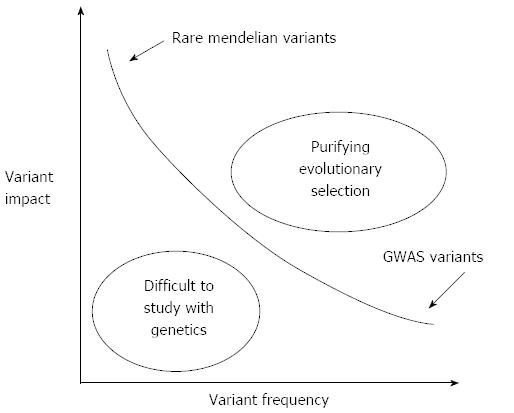Copyright
©2013 Baishideng Publishing Group Co.
World J Gastroenterol. Oct 28, 2013; 19(40): 6721-6729
Published online Oct 28, 2013. doi: 10.3748/wjg.v19.i40.6721
Published online Oct 28, 2013. doi: 10.3748/wjg.v19.i40.6721
Figure 1 Relationship between variant frequency and functional impact.
Rare and highly damaging variants such as those associated with familial forms of very early onset inflammatory bowel disease (IBD) tend to occur rarely in the population. They are unable to achieve high allele frequencies due to negative evolutionary selection. Variants captured by genome-wide association studies (GWAS), and which account for much of the population attributable risk of IBD, tend to be quite common but have small functional consequences (typically OR < 1.2). Rare variants with small impacts are difficult to assess statistically with the tools of genetics. Exome sequencing is intended to fill in the middle part of the curve: less common variants that have moderate impacts.
- Citation: Cardinale CJ, Kelsen JR, Baldassano RN, Hakonarson H. Impact of exome sequencing in inflammatory bowel disease. World J Gastroenterol 2013; 19(40): 6721-6729
- URL: https://www.wjgnet.com/1007-9327/full/v19/i40/6721.htm
- DOI: https://dx.doi.org/10.3748/wjg.v19.i40.6721









